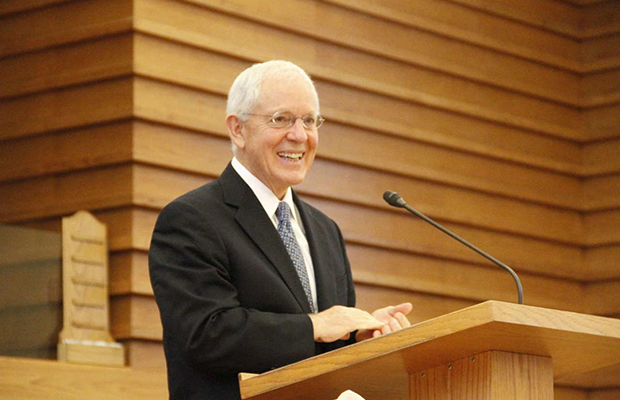Emeritus Seventy Shares 3 Methods He Uses to Know Joseph Smith Was a Prophet
Contributed By Valerie Johnson, Church News staff writer

Elder Marlin K. Jensen, emeritus General Authority Seventy, speaks during a BYU–Hawaii devotional on November 13, 2018.
Article Highlights
- 1. Gain knowledge through observation and evaluation.
- 2. Develop a testimony through experience.
- 3. Feel confirmation of truths through revelation.
“This Church is a thinking person’s Church.” —Elder Marlin K. Jensen, emeritus General Authority Seventy
Epistemology: a great word that can be used to impress others. It’s also the study of the methods of human knowing, or “how we come to know,” Elder Marlin K. Jensen said in a Joseph Smith lecture series and BYU–Hawaii devotional address on November 13.
As Elder Jensen, an emeritus General Authority Seventy and former Executive Director of the Church History Department and Church Historian and Recorder, has reflected on the origins of his personal beliefs about the restored gospel, he has realized that “gradually over my lifetime I had developed a simple epistemology, or way of knowing, that informs and supports the deeply held convictions that I have about my religion. There are things I know are true.”
In this digitized, sensualized, and skeptical modern world, developing personal religious convictions is more important than ever, Elder Jensen said. He shared three parts of his personal epistemology, each focused on the role played by Joseph Smith.
Knowing through observation and evaluation
In Matthew 7, the Savior gave His followers a way to determine the difference between false and true prophets, saying, “Ye shall know them by their fruits” (Matthew 7:16).
One can know a true prophet by his fruits, or the results or product of his life and teachings, Elder Jensen said. “This is a way of knowing based on observation and evaluation. This Church is a thinking person’s Church.”
Elder Jensen observed some of the fruits of Joseph Smith’s prophetic calling when his youngest child received her patriarchal blessing, including “the concept of our daughter’s place in the house of Israel, the priesthood authority to bless her, the principle that God reveals His mind and will concerning His children, even the knowledge that, in Joseph’s words, ‘an evangelist is a patriarch,’ and ‘whenever the church of Christ is established in the earth, there should be a patriarch for the benefit of the posterity of the saints,’” he said.
Joseph Smith’s teachings regarding the Godhead, the plan of salvation, agency, temporal welfare, salvation of the dead, revelation, and the Atonement of Jesus Christ are further examples of the fruits of a true prophet. “Because of them,” Elder Jensen said, “I know that Joseph Smith was a prophet of God.”
Knowing through experience
The Savior taught in John 7 that “if any man will do his will, he shall know of the doctrine, whether it be of God, or whether I speak of myself” (John 7:17).
One can know the truth of a doctrine or commandment by living it, Elder Jensen said.
As an example, he shared how he had never observed an honest 24-hour fast prior to his mission in Germany in 1961. Shortly after his arrival, his companion informed him that they would be fasting from food and drink for 48 hours. At that point, Elder Jensen vowed to learn more about the law of the fast.
“In the intervening years, by observing the law faithfully and, by gaining a greater understanding of its purposes, I have developed a firm conviction that it is a law of God,” Elder Jensen said.
“I am grateful the law of the fast is part of the gospel of Jesus Christ restored through Joseph Smith.”
Elder Jensen listed other principles revealed through Joseph Smith, like tithing, chastity, sacrifice, and consecration. “In these cases, and in many others, my experience in living the revealed truths has convinced me they come from God through Joseph Smith, a true prophet.”
Knowing through the Holy Spirit
In agreement with Paul, who said that “[no] man knoweth the things of a man, save the spirit of man which is in him[.] Even so the things of God knoweth no man, but the Spirit of God” (1 Corinthians 2:11), Elder Jensen said the one conclusive way of knowing that Joseph Smith was a true prophet is through personal revelation.
Before his mission, Elder Jensen never received a discernible spiritual confirmation that Joseph Smith was a true prophet, despite study and prayer. But when he and his companion had an opportunity to speak to a Lutheran congregation, he bore his testimony of Joseph Smith’s calling. “In that moment an overwhelming assurance came into my heart that what I was saying was true,” he said. “This feeling of assurance—given to me by the power of the Holy Ghost—has never left me.”
In the intervening years, Elder Jensen has been blessed to pray in the Sacred Grove and visit other sacred Church history sites. “At every occasion and place, my spiritual witness of Joseph Smith’s divine calling has been confirmed and strengthened. I know by the power of the Holy Ghost that he was a prophet of God.”

Elder Marlin K. Jensen at a devotional of the Mormon History Association Conference in 2012. Photo by R. Scott Lloyd, Church News archive.
